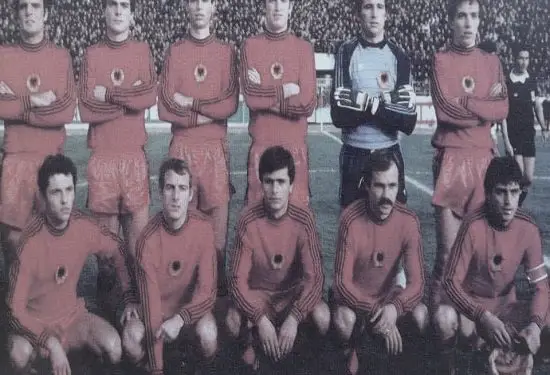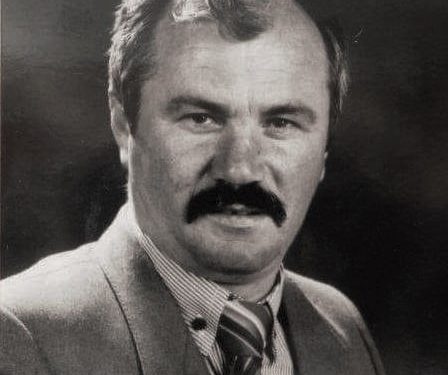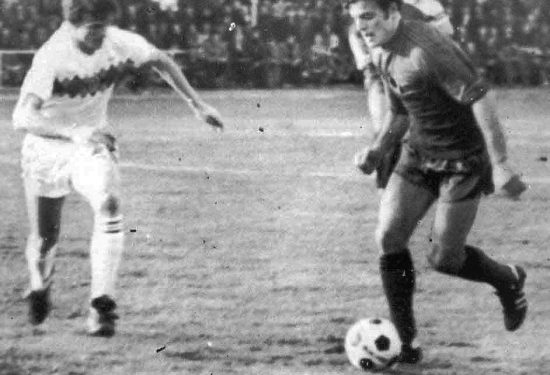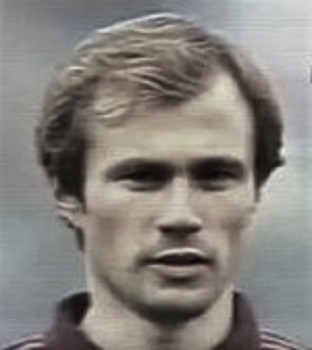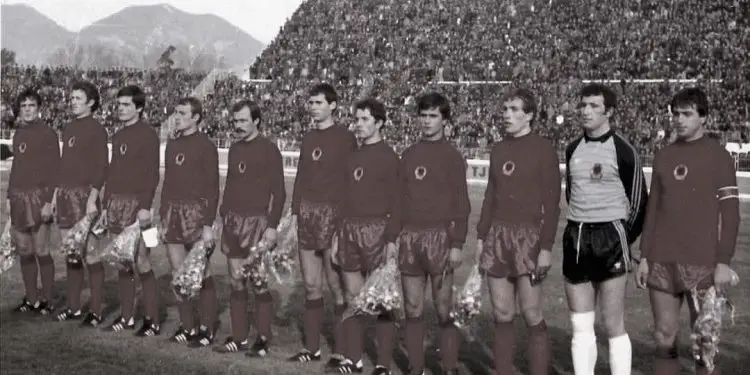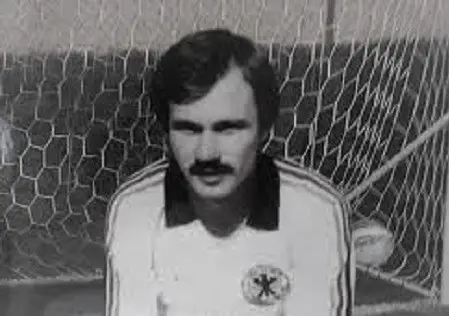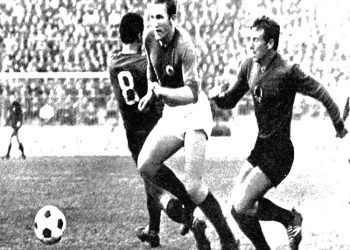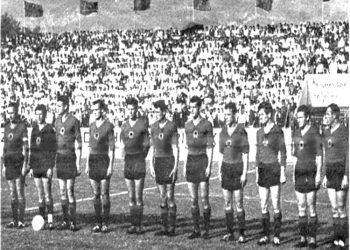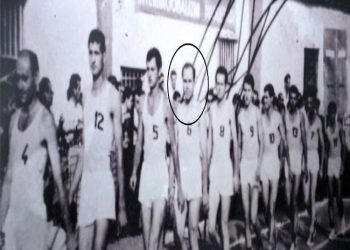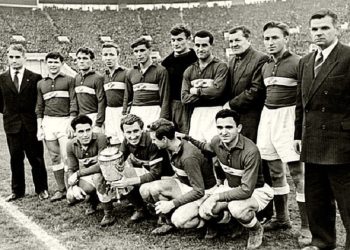Memorie.al / Losing the opportunity to participate in the World Cup, for a football player, is like kicking life. To know that they have sold this opportunity is so painful and absurd. But for Ferit Ragami, both happened in 1985. One of the stars of the national team of the years ’78-90, shows his doubts that someone from the Political Bureau of the Central Committee of the PPSh, with the orders he gave , also created the possibility for Albania to lose two of the matches where the fate of the world cup was decided. For the well-known football player of “Vllaznia” and “Partizan”, this is a pledge of life, something that will never be removed from his mind. In this interview, he tells why he suspects that the match, for one reason or another, was sold out. The order to refresh the national team and the tactical changes that were imposed from above. The vicissitudes of the defender, who did not allow him to continue the high sports school, because he had 7 Marxism. His life on the pitch, from the moment he touched the ball for the first time.
Mr. Rragami, how did you become a footballer?
Near my house in Shkodër, we had a football field and I started playing there since I was 6 years old. Then, in the fourth grade, I won the competition and entered the Sports School for children, which I continued until adulthood. I even won the competition for the Sports Mastery School in Tirana, where I graduated high school. I would have liked to have continued the Sports Master’s degree then, (Institute of Physical Culture “Vojo Kushi”), but they did not give me the right, since I had Marxism 7 and not 8, which was necessary to continue the high school.
Can you describe your career path?
I started with “Skhëndija”, the School Club of “Sports Mastery”, at first with young people, then with adults in the second category and, in the first category. When I failed to continue high school, I was transferred to “Vllaznia”, where I played until I reached the age of the army. While I was in the army, I played with “Partizan” for 3 years. I want to say that here, I had a great help and I was given the right to go out and play with the national team, and for this I thank Malik Sadushi and Ilir Hoxha, the son of the then leader, Enver Hoxha.
What is the first match with the national team?
With the national team, I quickly became active in a series of meetings. But the first game is against Finland in 1980, where we won 2-0.
What do you remember from the international matches you played, which left the most impression on you?
I remember well the meeting in 1984, with Poland, then ranked third in the world. We managed to lead the match until the last minutes 2 to 1 and only 7 minutes before the end, the Poles equalized the result at 2 to 2. There were two fantastic goals in that match, one by Omur and one by Agustin Kola.
The group of footballers you were a part of was named as one of the best national teams?
I remember that we were a group of good players, I don’t want to brag to anyone, but starting from the gate, with Perlat Musta, but also the results we achieved were very good. We thought then that we only needed one victory, which was valued at two points and a draw to go to the world cup and two draws to be included in the second elimination phase.
What do you remember from the meeting with Poland?
I remember this meeting, even though it was decisive. This was the moment that our national team was closest to qualifying for the World Cup. I even remember that there we also met the coach of Belgium, who had come to see the condition of the two opponents. There was an episode with the latter, after he came to the lobby of the hotel where we were and to provoke us he said: “You are Albanian footballers, there is no way, tomorrow you have to lose 7 to 0, because you are too weak. I remember that I, Musta and Ahmetaj, tried for about an hour to convince him that we were football players. In the end we told him: “Look, we are the football players of Albania and tomorrow we will not only play very well, but we will also win the match”. In fact we led throughout the match and the Poles of the great Bonjek equalized only at the end of the match.
You said that the national team had the opportunity to reach the World Cup finals. Why do you think this was not achieved?
I remember that, and then a mistake happened. I don’t know what to call it, but just when we had two games left and we only had to draw, an order came from above from the Political Bureau, which said: “Refresh 40 percent of the national team”, right at the base of this order, in the two following matches players from the first group were left on the bench and players taken from ‘Spresat’ were introduced. We lost the 2 games against Greece and Poland; they were points that we had no reason to lose. Think about it, we had drawn with Poland in Warsaw and beaten Belgium in Tirana. While we would lose to Poland here with the result 0 to 1 with a goal by Bonjek, who had just come from a meeting of the Champions Cup (Juventus-Liverpool) and had not rested at all. I remember he scored as soon as he came on. Even in Greece and in Athens, where the meeting took place, we conceded a goal in the first minutes.
Which footballers were absent and why do you think they were left on the bench?
I remember that Arjan Ahmetaj and I were on the bench, but also others from the basic formation. I can’t say that what happened was the coach’s decision, because at that time an order was enough and the coach was obliged to carry it out, it was the others who stood up and said, this one will play, this one will not play and this one cannot to be opposed.
Who was the person who gave the order to refresh the team?
Yes, of course I remember. It was one of the Political Bureau; I can’t tell you his name.
What reasons did he have for doing this?
I do not know. It was a mistake, intentional or unintentional. Some tactical changes were made, for which I cannot blame the coach, which led to the loss of matches.
How could such a mistake be made?
Then it could be done. An order came and that was it, you couldn’t change anything. There were also other problems, the translator of the national team escaped to Greece.
Were you sure you could win those dates?
Today I don’t know what would happen. Yes, we as a group were convinced that we could win those meetings. We had beaten the third country in the world, Poland, for 83 minutes, and they tied us only in the last 7 minutes. We had beaten Belgium, who qualified for the World Cup. We ourselves were sure that we would go to the final.
Why would someone from above give such orders?
The reasons were simple, we had to lose, and we didn’t have to go to the World Cup.
Who would want that and why?
They up. I can’t say for sure why, but the truth is that it happened. Someone didn’t want us to win, for their political reasons or…?!
Today there are many cases when matches are sold, don’t you want to say that even then there were such actions?
Look, even then there was smuggling like today, only it was centralized in someone’s hands.
So the game was sold out?
I have my doubts about that. Something happened and it was done in such a way that no one would suspect. Even the players themselves did not know that they would lose. Tactical changes were made, for which I cannot blame the coach, as I am sure he would not have made them. Then there was the order to refresh the team, meaningless, when the team was giving very good results. The players of the basic formation were removed and those of Spresa were introduced. Of course, even those who entered were players with perspective and a secure future, but they were inexperienced in meetings of this nature, even more decisive ones.
So we lost the World Cup, after the games were sold out?
I think yes. I have many doubts about this.
How did you feel after this happened?
I have been held hostage. It is certain that I will have him hostage to death. It is one of the things I will never forget. Think about it, we were standing on the bench and our legs were eating us to play and there the national team lost, in matches like the one with Greece, where we at least pretended to get a draw.
You have won several titles, which is the most important for you?
I have won 5 cups and three championships, as well as the title of Balkan Youth Champion. For me, titles are all important; they are the same.
What did you not like about football?
I didn’t like the shopping for the matches, the spies and the fact that the Albanian footballers often brought contraband goods from abroad.
What would be the profession you would have chosen if you had not become a footballer?
Singer of folk songs of Central Albania and lyrical songs.
What helped you become a good soccer player?
I was not a technician nor descended from the sky, have I achieved everything through work.
Do you remember the most beautiful goal you scored?
I was a defender and midfielder, but I scored. I can’t say that I remember the most beautiful goal, but the most important was the one against Flamurtar in Vlora. While from afar I have scored several goals and the one I remember is the goal against Rijeka in Yugoslavia, where I had gone as reinforcement for “Skënderbeu” from Korça. I shot and scored almost from 35 meters.
Who are the opponents and players you rated the most?
In world football, even though it didn’t suit me as a type and as a footballer, I liked Brazilian football. In Albania at that time, I liked a number of teams such as: “Dinamo”, “Partizani”, “Tirana” and definitely “Vllaznia”. While the best opponents here, I have always appreciated Andrea Marko from “Dinamo”.
If you had the chance, which foreign club would you have played for?
I had offers from “Bryzh” of Belgium, which was highly valued at the time. But I would like to have played with “Milan” in Italy’s Serie A.
How and why did you leave football?
It’s a long story. In 1990, they asked us to lose a match against the “Beslidhja” team from Lezha, so that they would not be relegated, but I refused. In that meeting, I entered the second half and scored the two winning goals 4 to 2. After that, in the cup match with “Dinamon”, those who had agreed to sell the match with Lezha lost the penalties that would have taken us to the final of cup. After the match I went and greeted everyone and left, I couldn’t stand these things in football. I played the farewell match 3 months later.
Would you still have played?
Yes, at least three more years.
Do you follow Albanian football now?
No. I don’t like what is done with football now and the way it is run. I followed the national team; I was even in the stadium in the match with Greece. Work doesn’t leave me much time for football, but of the Albanian players I’ve followed who play abroad, I liked Adrian Aliaj the most in his defensive game and the power of hitting the ball.
Who was the best coach you had?
I have had many great coaches such as: Shyqyri Rreli, Loro Boriçi and others, but Bejkush Birçe is my idol. He was the only coach who argued with the members of the Political Bureau about the problems of the football players.
Goalkeeper you admire the most and feared?
Of the goalkeepers, I would particularly appreciate Musta. During my football career and as far as I know football, Albania has not had a better goalkeeper than Perlat Musta.
Resume
Name: Ferit Ragami
Birthday: 1957
Place of birth: Shkodër
Residence: Tirana
Profession: Football player, currently manager.
He played with: “Vllaznina” (1976 – ’78, ’81 – ’90), “Partizan” (1978 – ’81), Shkëndija (1972 – ’76)
Appraisals:“Honored Master of Sports”
The national team that surprised the world
The story of the Albanian national team that played in the years 1984-1986 for the World Cup qualifiers in Mexico is probably the most beautiful and saddest part of the history of Albanian football. Of course, not only then, but even today, the boys who represent the colors of our country, in football, are always in the center of attention of most of the country. But then, Albania could have been a world surprise.
Albania, led by Shyqyri Rrelin, would draw 2 to 2 with Poland, which was one of the best teams in the world, and a year later, would win against Belgium, which was at its peak. Perlat Musta, Hysen Zmijani, Skënder Hodja, Mujo Targaj, Adnan Ocelli, Ferit Rragami, Sulejman Demollari, Shkëlqim Muça, Mirel Josa, Arben Minga, Agustin Kola, Bedri Omuri, and many others, were the Albanians who put Poland in a position of Bonjek, European champion with “Juventus” and Shifo’s Belgium.
Of course, it was a group, quite hopeful. Even, a part of these players had led Albania to the 8th of Europe’s best hopes. An unrepeatable constellation, which would end those qualifiers with a score of 6-6. (T.O) Memorie.al




